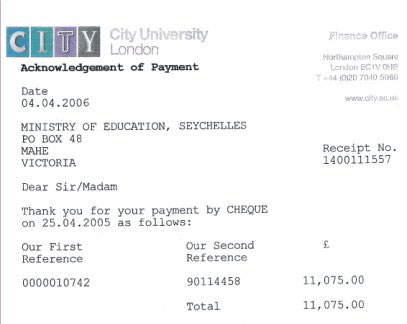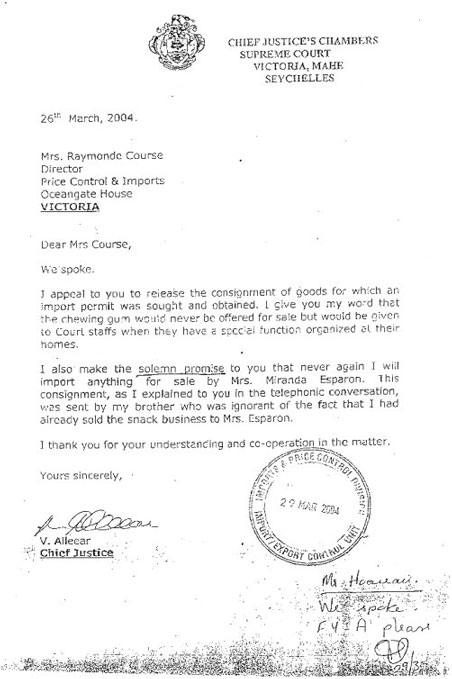

HAS THE CHIEF JUSTICE COMPROMISED THE
This newspaper has obtained evidence that the Chief Justice of Seychelles, Vivekanand Alleear, claimed at least two privileges from the government in a manner which jeopardizes the independence of the Judiciary, one of which directly involves the application of justice in
The first and most damaging evidence which this newspaper has concerns one of the children of the Chief Justice – Dara Alleear - who has never lived in

If this is a scholarship then Dara Alleear does not qualify to receive any sponsorship from the Seychelles Government since he is not a Seychellois and did not attend school in the
The payment to the
Whilst the S.P.P.F Government has been sending Seychellois students to Universities in
The other evidence in the possession of this newspaper concerns an incident in which the Chief Justice implored a government official not to prosecute one of his business associates who had broken the import control regulations. The evidence we have confirms rumours that have been rife in
In March 2004 a trading concern owned by Alleear received a consignment of chewing gum from
Rather than let justice take its course, Alleear wrote a letter to the director of Price Control and Import, Mrs Raymonde Course, on the Chief Justice’s Chambers letterhead appealing to the lady for leniency claiming that the chewing gums will not be put on sale but rather “would be given to Court staffs when they have a special function organised at their homes.”

Alleear claimed in his letter that he had told Mrs course in an earlier telephone conversation that he had already sold the business to a Mrs Miranda Esparon but that his brother, who obviously was not living Seychelles, had sent the goods not knowing that he had already sold the business. Yet the Chief Justice seems to have undermined this excuse when he pleaded with Mrs Course in the letter “I also make the solemn promise to you that never again I will import anything for sale by Mrs. Miranda Esparon.” At the time of going to press it is not known how many members of staff of the Supreme Court have so far organised special functions since March 2004, and if they benefited from the chewing gums.
The Judiciary, along with the executive and the legislative, are the cornerstones of our constitution. The constitution provides that the “judiciary shall be independent and be subject only to this constitution and the other laws of
If the Chief Justice sought such favours and the government obliged, then the question which begs an answer is this: Is the Chief Justice not compromising his position as head of the judiciary?
The judiciary is one of the pillars of our democracy and according to the doctrine of separation of powers, it should remain and act independently of the Executive and the Legislative. By accepting favours from the Executive is the Chief Justice not compromising that very same independence that he has sworn to uphold?